Dialogue with a person outside of the aG regarding environmental initiatives
Realizing Well-being Based on a Sustainable Global Environment through the SDGs
—“Future Scenarios” Drawn with New Ideas from All Employees—
Ayako Sonoda (left)
Representative Director and Chairman of Cre-en Incorporated
Tomoyuki Takeda (center)
Managing Executive Officer, Azbil Corporation
Responsible for Work-Style Creation (Well-being), azbil Group
Hideaki Ishii (right)
Managing Corporate Executive, Azbil Corporation
Responsible for Environmental Impact Reform, azbil Group
There is a growing focus on well-being in society. In particular, more companies are now shifting their focus to well-being management to enhance the ongoing happiness of their stakeholders, including employees and customers. In the environmental seminar held by Azbil, Ayako Sonoda, the founder of Cre-en Inc., who has been involved in providing sustainability consulting and planning and producing reports for many domestic companies, totaling approximately 900, was invited to explain how to achieve well-being rooted in a sustainable global environment. In a workshop that was also held, Azbil employees who participated in the event each drew up a scenario for the future up to 2040 and used backcasting to consider the innovations that would be needed to make that scenario a reality. In the third-party dialogue that followed, Hideaki Ishii, Managing Corporate Executive in charge of Environmental Impact Reform for the azbil Group, and Tomoyuki Takeda, Managing Executive Officer in charge of Work-Style Creation (Well-being) for the azbil Group, spoke to Ms. Sonoda.
The “environment” as the foundation supporting people’s well-being
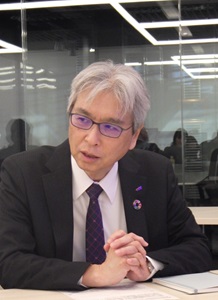
Ishii First of all, please tell us what “well-being” means and what the current trends surrounding it are.
Sonoda Well-being itself refers to a “state of physical, mental, and social well-being,” and it is said to have spread as a concept after being used to define “health” in the World Health Organization (WHO) constitution adopted in 1946. For example, one of the goals set out in the Sustainable Development Goals (SDGs) is “Good health and well-being (Ensure healthy lives and promote well-being for all at all ages),” but originally, it is a much broader concept. Additionally, for the 2021 World Economic Forum (Davos Conference), the theme was set as “The Great Reset,” which involves rethinking and revamping every aspect of our society and economy for a better world, and the necessity of reconsidering people’s well-being was proposed. Today, based on the idea that economic activities are part of other things such as society and nature, there is a movement spreading worldwide to view well-being as an economic indicator on par with the GDP of countries and regions, using multifaceted indicators such as health, standard of living, quality of the natural environment, labor security, and citizen political participation. Regarding this, Dr. Johan Rockström, a globally renowned scientist in sustainability research, has presented the so-called “SDGs wedding cake model,” which consists of three tiers: environment, society, and economy, with the environment, our life source, at its base. In other words, the environment can be said to be the foundation supporting people’s well-being.
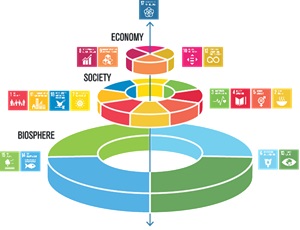
Source: Stockholm Resilience Center “The SDGs wedding cake”
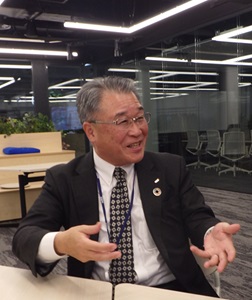
Takeda In short, society and the economy exist because of the environment. In the value system of capitalist societies until now, the economy-first mindset has been central. So, in the future, people all over the world will need to share environmental conservation in addition to economic viability. It will be the key to ensuring a comfortable life for our children and grandchildren. In other words, the environment is the foundation when considering well-being. So, what is the current situation regarding well-being movements in Japan?
Sonoda In Japan as well, the 2021 edition of the government’s so-called “Basic Policy” explicitly states the “establishment of KPIs related to well-being” in various government basic plans. In the field of public policy at central ministries and agencies, KPIs related to well-being have been set in 32 basic plans. In the 2023 edition, the text includes “promoting the use of well-being indicators in local governments.” For example, Toyama Prefecture has set its own well-being indicators, and there is increasing activity in quantifying and visualizing regional happiness based on the realization of the Digital Garden City Nation concept. Of course, these trends surrounding well-being in society are also having a major impact on corporate management. An increasing number of companies are turning toward well-being management, centered on work-life balance, promoting diversity and inclusion, and improving employee engagement. For example, a report from Oxford Business School shows that high employee well-being leads to better employee performance and corporate performance, and can be expected to lead to future growth. Naturally, stock market performance will also improve, and it can be said that investing in well-being will become an important point for companies to succeed in their business in the future.
Hopes for the promotion of automation that contributes to the global environment
Takeda In today’s workshop, participants were divided into teams of four and used a backcasting approach to draw up both the best-case and worst-case scenarios for the year 2040. Each team then considered what innovations would be needed to realize the best-case scenario and what value Azbil’s measurement and control technologies could bring. I believe that this workshop provided various insights to each participant, helping them consider the future of the global environment and how Azbil can develop its business toward 2040. Was there anything that you noticed, Ms. Sonoda?
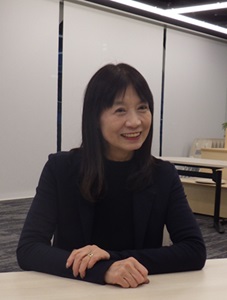
Sonoda What was most striking was that in their best-case future scenarios, many teams highlighted keywords like “a world without war” and “world peace.” Certainly, topics related to wars, such as the conflict between Russia and Ukraine or the armed clashes between Israel and Gaza, are significant in daily news. However, in my experience conducting similar workshops at various companies, I’ve never encountered so many teams using these keywords. In that sense, it is evident that Azbil employees are highly attuned to societal issues and maintain a broad perspective and strong awareness of various problems during their daily lives. Of course, this is also important from the perspective of well-being, and I felt that this background is a strength in creating innovation in your business.
Takeda Azbil has long defined comprehensive initiatives such as work-style reforms and the promotion of diversity as “health and well-being management,” implementing various measures to ensure that employees can work healthily and enthusiastically. We recognize that Azbil is a part of society, and we see solving societal challenges and promoting our business as our areas of growth. In this way, we will grow as a company by contributing to society, which will help enhance the well-being of our employees and lead to increased investment in human capital. We would like to pursue such a virtuous cycle of management.
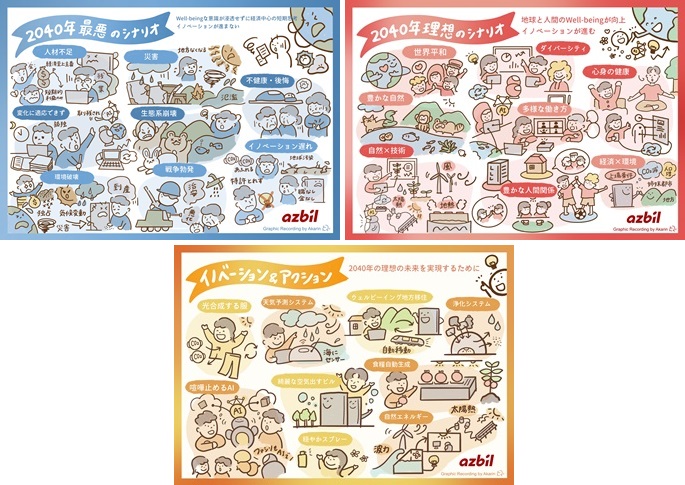
Young talent driving new innovation
Sonoda The azbil Group’s philosophy is “human-centered automation,” but from the perspective of well-being, I believe it is important to explicitly emphasize “contribute to global environmental preservation,” which is also stated in the azbil Group’s philosophy, in addition to “human.” For example, Dr. Rockström and his colleagues use the term “planetary boundaries” to highlight the limits that humans are facing due to their activities in agriculture, industrial operations, and commerce, which utilize natural resources and impact the environment by destroying forests and oceans. I sincerely hope that the azbil Group will focus on initiatives that make full use of its inherent measurement and control technologies to promote what we might call "well-being automation," which will directly lead to the resolution of these problems. This should serve as an engine for future business growth and drive the creation of groundbreaking innovation.
Ishii At Azbil, as we envision the future of our business as you describe it, it is essential to focus on how we cultivate talent with new ideas. Needless to say, the ones who carry these expectations are the young employees currently working on-site at our company, as well as the new talent who will join us in the future. For example, the azbil Group holds an event called the Techno Conference twice a year as a forum for technical exchange. At this event, it is primarily our younger employees who actively present new initiatives aimed at the sustainability of the global environment, such as the “Kabochare,” which is focused on achieving carbon neutrality.
Sonoda These young people have been learning about the need to restore the global environment, including the SDGs, during their school education. Therefore, I believe young people can come up with new ideas related to the environment that veteran employees might not have. Additionally, there is a noticeable trend among students to seek employment at companies actively engaged in sustainability activities. From the perspective of acquiring talented individuals who will drive innovation in your company, it is essential to place even greater emphasis on sustainability activities moving forward.
Ishii Yes, I agree. Additionally, Azbil is sponsoring the Theme Weeks at Expo 2025 (Osaka, Kansai, Japan), which will be held from April 13 to October 13, 2025. We plan to present and hold discussions with experts on five themes, including “The Future of the Earth and Biodiversity” and “Health and Well-being,” at the expo venue. The planning and management of these initiatives are being advanced company-wide, primarily by many younger employees. Through these activities, we hope to raise the overall awareness of well-being among employees and strengthen engagement. Of course, the promotion of well-being, including contributions to the global environment, cannot be achieved by the azbil Group alone. In that sense, we hope to deepen exchanges with other companies through this expo and explore opportunities to create new innovations through collaborations outside the company.
Sonoda I’m really looking forward to that. Not just at the Osaka-Kansai Expo, but in various other settings in the future, I hope you will continue to convey exciting messages to future generations.
Ayako Sonoda, Representative Director and Chairperson of Cre-en Incorporated.
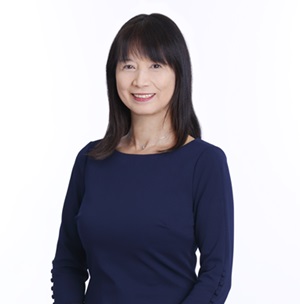
Profile
Ayako Sonoda
Representative Director and Chairman of Cre-en Co., Ltd.
Outside Director of Mitsubishi Estate Co., Ltd.
Outside Director of Lotte Co., Ltd.
Biography
Born in Nishinomiya City, Hyogo Prefecture. Graduated from the Department of Sociology, Faculty of Letters, Konan University. In 1988, she founded Cre-en, a marketing company centered on women. Around 1995, she started its sustainability business, and since then, they have supported the planning and production of sustainability consulting and reports for major retail groups, large housing and food manufacturers, and many others. Since 2015, she has also achieved significant success in consulting related to SDGs and ESG investment. She currently serves as an Outside Director of Mitsubishi Estate Co., Ltd., Outside Director of Lotte Co., Ltd., Representative Director of the Mirai RITA Foundation, Secretary-General of the Sustainability Forum Japan (Specified Nonprofit Corporation), Director of the ALLIANCE FOR THE BLUE (General Incorporated Association), Director of the Japan Sustainable Investment Forum (Specified Nonprofit Corporation). Additionally, as part of her educational activities for the next generation, she works as an Adjunct Professor at the Graduate School of Leadership and Innovation, Shizenkan University.
- Overall of Environmental Initiatives
- Contributing to the environment through our core businesses
- Reducing the environmental impact of our own business activities
